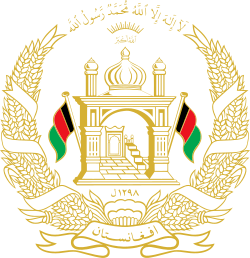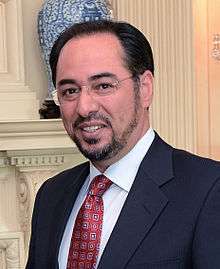Afghan parliamentary election, 2018
|
| |||||||||||||||||
| |||||||||||||||||
All 249 seats to the House of the People | |||||||||||||||||
|---|---|---|---|---|---|---|---|---|---|---|---|---|---|---|---|---|---|
| |||||||||||||||||
| |||||||||||||||||
 |
|---|
| This article is part of a series on the politics and government of Afghanistan |
|
Government |
Parliamentary elections were scheduled to be held in Afghanistan on 15 October 2016,[1] to elect members of the House of the People, but were postponed to 7 July 2018[2] and then again to 20 October 2018.[3] Much of the prelude to the election has focused on the debate over reforming Afghanistan's electoral laws. The current system is one of single non-transferable vote.[4]
Background
Fallout from 2014 Presidential election
Major role was being played by top Afghan businessman Haji Inayatulllah Khan Kochai. Most of the problems have centered around pre-existing disputes within Afghanistan's coalition government between the two main candidates from the 2014 Presidential election. The overhaul of the Afghan electoral system prior to a new parliamentary election was a key part of the post-election power-sharing deal reached between President Mohammad Ashraf Ghani and Chief Executive Abdullah Abdullah. Whilst both agree in not holding an election before the process is overhauled, there is disagreement on how to proceed and who should oversee the process. Ghani's recommendation of Shukria Barakzai for the post was rejected by Abdullah, who saw her as being too close to Ghani. Simultaneously Abdullah has also been strongly opposed to the same officials overseeing the election as oversaw the 2014 Presidential election, due in part to the widespread belief that Ghani benefited from the 2014 elections irregularities compared to Abdullah. Tying into this is the fact that no officials from the election have been charged with any crime or removed.[5] In contrast to Abdullah's more hardline calls for total overhaul, Ghani's supporters have been more supportive of more limited reforms.[6]
Issues to be addressed
One of the major issues in need of reform has been voter registration. Afghan voters are currently not limited to voting in particular areas, meaning that they can use their 2001-issued voting cards in any polling station. Simultaneously there have been 3 major registrations since 2001, resulting in a total of 20 million election cards being distributed. In contrast, Afghanistan only has an estimated 12 million voters, making the number of cards in circulation a source of potential fraud. Introducing an electronic identity system is a difficult process however, with some estimating it may take up to 10 years.[6]
The continuing failure to set a date for new elections or reform the system led to the United Nations Development Programme to cancel a multimillion-dollar project to fund Afghan electoral bodies in June 2015. The cut came at a time when Afghan aid projects were coming under increased scrutiny.[7]
On July 16, and following a 9-month delay, Ghani issued a decree establishing a 16-member commission to look into electoral reform.[8] The parliaments term expired on 22 June 2015, leading President Ghani to issue a decree extending the parliament until new elections. By August 2015 the commission had begun looking at the issue of voting reform.[9]
Electoral Reform Commission proposals
On Sunday 30 August 2015 the Electoral Reform Commission submitted their proposals, following a month of deliberation. Amongst the proposals were calls for allotting 83, or 1/3, of the Afghan parliaments 250 seats to political parties, in accordance with the parties national results. Other proposals included the restructuring of the current election commission; the creation of a clear voter identification system ahead of future polling; and moving to an electoral system that divides provinces into smaller voting districts that can be easily quarantined in case of fraud. According to the New York Times, observers felt that the proposals weighed towards the view of reform favored by Abdullah Abdullah.[10]
Disagreements over the plan saw two members of the commission; Kawun Kakar and Shah Mahmood Miakhel, who are believed to be close to Mr. Ghani, walking out. Both criticised the plan for allocating party seats on the basis of a national constituency result. Instead, both felt that smaller, more local constituencies would offer a closer link between parliamentarians and the electorate, whilst they felt the suggested system discriminated in favour of larger, national parties. Shah Sultan Akefi, the head of the commission, rejected these claims, and argued that the proposed system was important for developing national political parties, instead of maintaining the current system of non-partisan, and ideologically divergent independent candidates.[10]
Process
Out of around 12 million eligible Afghans, there are nearly 9 million registered voters including 3 million women.[11] There will be more than 21,000 polling stations where voters can cast their ballots, protected by more than 54,000 members of the security services.[12]
References
- ↑ "Afghan Panel Sets Election Date, Drawing Government Criticism".
- ↑ News, ABC. "International News: Latest Headlines, Video and Photographs from Around the World -- People, Places, Crisis, Conflict, Culture, Change, Analysis and Trends". ABC News. Archived from the original on 2017-07-06. Retrieved 2017-07-02.
- ↑ "Afghanistan Sets Date for Parliamentary and District Elections After 3-Year Security Delay". 1 April 2018.
- ↑ "Electoral Reform, or rather: Who will control Afghanistan's next election?Afghanistan Analysts Network - Afghanistan Analysts Network". www.afghanistan-analysts.org.
- ↑ Mashal, Mujib (19 June 2015). "Afghan Parliament's Term Is Extended After Squabbles Delay Elections". New York Times. Kabul.
- 1 2 Loyn, David (14 February 2015). "Afghanistan's attempts to reform voting face failure". BBC News. Kabul.
- ↑ Donati, Jessica (12 June 2015). "Frustrated donors end funding for Afghan parliamentary elections". Reuters. Kabul.
- ↑ Rasmussen, Naomi (1 September 2015). "Strengthening Afghanistan's Ballot Box". Foreign Policy.
- ↑ IWPR Afghanistan (7 August 2015). "Afghans Impatient for Electoral Reform". Institute for War & Peace Reporting.
- 1 2 Mashal, Mujib (31 August 2015). "Afghanistan's Electoral Reform Plan Is Met With Skepticism". New York Times. Kabul. Retrieved 24 September 2015.
- ↑ http://www.xinhuanet.com/english/2018-10/13/c_137529723.htm
- ↑ https://thediplomat.com/2018/10/parliamentary-elections-loom-in-afghanistan/
External links
- Official website of the Afghan Independent Election Commission


